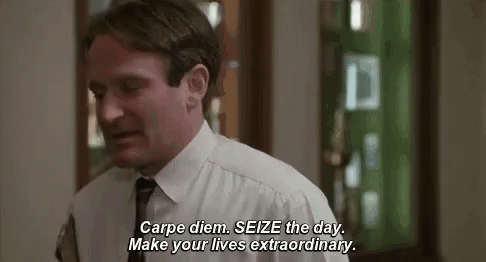How This Fear Setting Exercise is Helping Me Travel the World
A younger version of my always wanted to spend a lot of my life traveling and seeing the world. The older version of me felt constrained to doing so just once or twice a year at max for a few weeks at time. Anything longer than that, felt too long and a bit risky to even ask for.
Earlier this week, I asked my manager to work from Vietnam for 3 full months.
It's a conversation that I had played back and forth in my head for months before actually finally summoning up the courage to make the ask.
But after our one month trip to Vietnam last year, Kelly and I could really see ourselves staying and living there for even longer. So a new dream of living in Asia and travel to Japan, Korea, Bali, and across Vietnam started growing for us.

I figured that if we kept going down the path we were on, it would take us another 4-5 years for us to get to all these places and multiple transpacific flights to make it happen.
If we could base ourselves in Vietnam for an extended time, we could easily do 4-5 years worth of international travel in just 3-6 months.
But I had heard of only a few people at my company working abroad, and definitely not to the extent that I was hoping to do so.
What would my manager think? How would this impact my career growth? What do we do with our house? What if all our plants die? On and on, concern after concern started to stack up.
While listening to an audiobook of the "Pathless Path" Paul Mellird talked about a fear setting exercise that he uses regularly to help him with decisions. So I paused the book and looked up Tim Ferris' Fear Setting Exercise.
Instructions for the Fear Setting Exercise
If you are nervous about making the jump or simply putting it off out of fear of the unknown, here is your antidote. Write down your answers, and keep in mind that thinking a lot will not prove as fruitful or as prolific as simply brain vomiting on the page.
Write and do not edit—aim for volume. Spend a few minutes on each answer. Define your nightmare, the absolute worst that could happen if you did what you are considering. What doubt, fears, and “what-ifs” pop up as you consider the big changes you can—or need—to make? Envision them in painstaking detail. Would it be the end of your life? What would be the permanent impact, if any, on a scale of 1–10? Are these things really permanent? How likely do you think it is that they would actually happen?
- What steps could you take to repair the damage or get things back on the upswing, even if temporarily? Chances are, it’s easier than you imagine. How could you get things back under control?
- What are the outcomes or benefits, both temporary and permanent, of more probable scenarios? Now that you’ve defined the nightmare, what are the more probable or definite positive outcomes, whether internal (confidence, self-esteem, etc.) or external? What would the impact of these more likely outcomes be on a scale of 1–10? How likely is it that you could produce at least a moderately good outcome? Have less intelligent people done this before and pulled it off?
- If you were fired from your job today, what would you do to get things under financial control? Imagine this scenario and run through questions 1–3 above. If you quit your job to test other options, how could you later get back on the same career track if you absolutely had to?
- What are you putting off out of fear? Usually, what we most fear doing is what we most need to do. That phone call, that conversation, whatever the action might be—it is fear of unknown outcomes that prevents us from doing what we need to do. Define the worst case, accept it, and do it. I’ll repeat something you might consider tattooing on your forehead: What we fear doing most is usually what we most need to do. As I have heard said, a person’s success in life can usually be measured by the number of uncomfortable conversations he or she is willing to have. Resolve to do one thing every day that you fear. I got into this habit by attempting to contact celebrities and famous business people for advice.
- What is it costing you—financially, emotionally, and physically—to postpone action? Don’t only evaluate the potential downside of action. It is equally important to measure the atrocious cost of inaction. If you don’t pursue those things that excite you, where will you be in one year, five years, and ten years? How will you feel having allowed circumstance to impose itself upon you and having allowed ten more years of your finite life to pass doing what you know will not fulfill you? If you telescope out 10 years and know with 100% certainty that it is a path of disappointment and regret, and if we define risk as “the likelihood of an irreversible negative outcome,” inaction is the greatest risk of all.
- What are you waiting for? If you cannot answer this without resorting to the previously rejected concept of good timing, the answer is simple: You’re afraid, just like the rest of the world. Measure the cost of inaction, realize the unlikelihood and repairability of most missteps, and develop the most important habit of those who excel and enjoy doing so: action.
That night I spent about an hour working on this exercise. My question was "What's keeping me from moving to Vietnam for 3 months?"
While doing this exercise I started to realize that though the fears I had were real, the likelihood of them having a long term impact on us were limited.
I probably wouldn't lose my job if I asked to take 3 months unpaid leave, even less likely if I asked to work while being in Vietnam and take PTO as needed.
And if even if I did lose my job, one of the fear setting prompts helped me create a contact list of old managers and friends that I could reach out to help me find a new gig within a few months.
My brother also recently moved in with us so that helps address my concerns about house and our plants.
I defined every little fear I had and mapped it out to a response and actions that I could take to help mitigate any downsides.
Bit by bit, my fears started to fade into excitement about this life that we might actually get to live.
I love that this fear setting exercise also forced me to think about the potential upside of moving to Asia for 3 months and the cost of postponing action.
Here are some things I wrote.
Cost to Postponing Action:
- My childhood self would be so disappointed in who I had become. I will feel like I had folded to the corporate ladder - climbing and climbing, and never actually living and doing things that I always wanted to do.
- Not doing this could mean that I lose more of myself.
- What if I become so out of touch with my inner voice and desires that I can no longer truly see or hear my authentic self?
- Five or ten years from now, I might not have the chance or be able to do this.
- It'll be really disappointing if I let my circumstances dictate where I am, rather than being in the driver's seat.
Potential Upside:
- Scratching the itch and desire to be untethered for an extended amount of time, traveling to new places and experiencing different cultures
- I could potentially see or learn about a new business opportunity.
- I could meet someone who inspires me or impacts me (new business partner, mentor, or fellow dreamer).
- I would gain confidence that I could make this kind of lifestyle work.
By the end of the night, I had even built up the resolve to quit my job if needed to make this happen.
My inner-child broke free for a moment, and I so deeply wanted to seize life and not just be a bystander to inertia.
Once that feeling came back, it became impossible to ignore.
I had addressed my fears, and felt fully ready to go to battle with my manager to make it happen.
Making the Ask
At the end of my 1:1 with my manager, I made the ask.
I shared with him how I wanted to base myself in Vietnam for 3 months for Kelly to be closer to family and for us to be able to visit other countries that we've always wanted to go to.
I could align 4 hours a day to Eastern Time to be available for calls and get my other work throughout the day. And that I could be flexible on travel dates and the details, but that this was one of my big personal goals.
As I was getting ready to provide more reasons on why we wanted to do it, he barely even hesitated and said, "I'm open to it, as long as you can stay productive."
Well, that went much smoother than I thought. What was I so afraid of? Was it really all just in my head?
Though I'm still waiting for him to clear it HR and our GM, I'm thankful I came across the fear setting exercise when I did because it helped me take action.
Every so often, I feel this cloudiness of undefined fears and this fear setting exercise helps to clear the fog. It's one that I have saved and will be putting to use often. I hope that you'll find it helpful as well!
I'm reminded that some of the best things in life are just on the other side of our fears.
And that by defining ours fears, we can remove it's power and begin conquering them.
So what are you waiting for?

